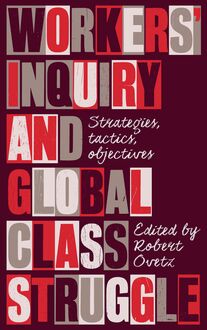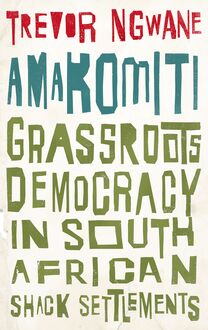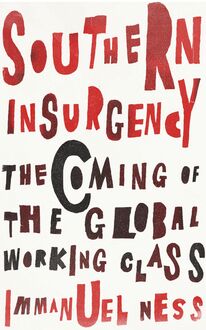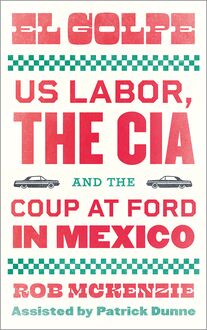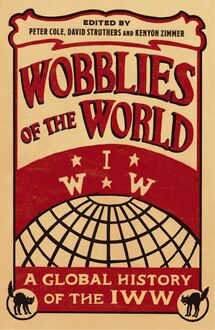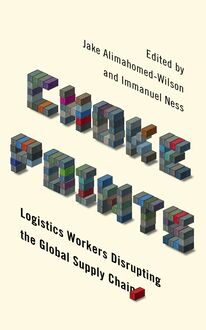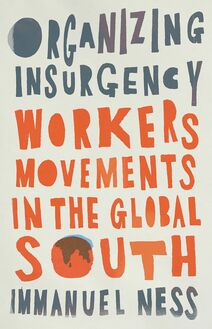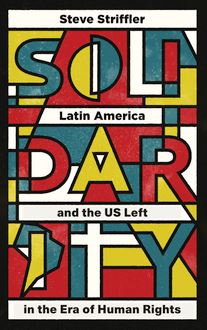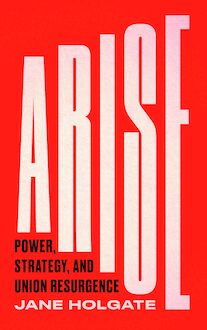Solidarity , livre ebook
145
pages
English
Ebooks
2019
Vous pourrez modifier la taille du texte de cet ouvrage
Obtenez un accès à la bibliothèque pour le consulter en ligne En savoir plus
Découvre YouScribe en t'inscrivant gratuitement
Découvre YouScribe en t'inscrivant gratuitement
145
pages
English
Ebooks
2019
Vous pourrez modifier la taille du texte de cet ouvrage
Obtenez un accès à la bibliothèque pour le consulter en ligne En savoir plus
Publié par
Date de parution
20 janvier 2019
Nombre de lectures
1
EAN13
9781786802606
Langue
English
In Solidarity, Steve Striffler addresses these key questions, offering the first history of US-Latin American solidarity from the Haitian Revolution to the present day. Striffler traces the history of internationalism through the Cold War, exploring the rise of human rights as the dominant current of international solidarity. He also considers the limitations of a solidarity movement today that inherited its organisational infrastructure from the human rights movements.
Moving beyond conventionally ahistorical analyses of solidarity, here Striffler provides a distinctive intervention in the history of progressive politics in both the US and Latin America, the past and present of US imperialism and anti-imperialism, and the history of human rights and labour internationalism.
Acknowledgments
Introduction
1. US Empire, Anti-Imperialism, and Revolution
2. The Caribbean under U.S. Occupation
3. The Cuban Revolution and the Cold War
4. South American Dictatorships and the Rise of Human Rights
5. Central American Solidarity in Reagan’s America
6. NAFTA, Fair Trade, and Globalization
7. Zapatistas and Global Justice
8. Corporate Campaigns and Sweatshop Activism
Conclusion
Notes
Index
Publié par
Date de parution
20 janvier 2019
Nombre de lectures
1
EAN13
9781786802606
Langue
English
SOLIDARITY
Wildcat: Workers Movements and Global Capitalism
Series Editors:
Immanuel Ness (City University of New York)
Peter Cole (Western Illinois University)
Raquel Varela (Instituto de Hist ria Contempor nea (IHC) of Universidade Nova de Lisboa, Lisbon New University)
Tim Pringle (SOAS, University of London)
Peter Alexander (University of Johannesburg)
Malehoko Tshoaedi (University of Pretoria)
Workers movements are a common and recurring feature in contemporary capitalism. The same militancy that inspired the mass labour movements of the twentieth century continues to define worker struggles that proliferate throughout the world today.
For more than a century, labour unions have mobilized to represent the political-economic interests of workers by uncovering the abuses of capitalism, establishing wage standards, improving oppressive working conditions, and bargaining with employers and the state. Since the 1970s, organised labour has declined in size and influence as the global power and influence of capital has expanded dramatically. The world over, existing unions are in a condition of fracture and turbulence in response to neoliberalism, financialization, and the reappearance of rapacious forms of imperialism. New and modernized unions are adapting to conditions and creating a class-conscious workers movement rooted in militancy and solidarity. Ironically, while the power of organized labour contracts, working-class militancy and resistance persists and is growing in the Global South.
Wildcat publishes ambitious and innovative works on the history and political economy of workers movements, and is a forum for debate on pivotal movements and labour struggles. The series applies a broad definition of the labor movement to include workers in and out of unions, and seeks works that examine proletarianization and class formation; mass production; gender, affective and reproductive labour; imperialism and workers; syndicalism and independent unions, and labour and leftist social and political movements.
Also available:
Choke Points: Logistics Workers Disrupting the Global Supply Chain
Edited by Jake Alimahomed-Wilson and Immanuel Ness
Just Work? Migrant Workers Struggles Today
Edited by Aziz Choudry and Mondli Hlatshwayo
The Spirit of Marikana: The Rise of Insurgent Trade Unionism in South Africa
Luke Sinwell with Siphiwe Mbatha
Wobblies of the World: A Global History of the IWW
Edited by Peter Cole, David Struthers and Kenyon Zimmer
Southern Insurgency: The Coming of the Global Working Class
Immanuel Ness
Working the Phones: Control and Resistance in Call Centres
Jamie Woodcock
Solidarity
Latin America and the US Left in the Era of Human Rights
Steve Striffler
First published 2019 by Pluto Press
345 Archway Road, London N6 5AA
www.plutobooks.com
Copyright Steve Striffler 2019
Published under the Creative Commons CC BY-NC-ND 4.0 licence
The right of Steve Striffler to be identified as the author of this work has been asserted by him in accordance with the Copyright, Designs and Patents Act 1988.
British Library Cataloguing in Publication Data
A catalogue record for this book is available from the British Library
ISBN 978 0 7453 9920 1 Hardback
ISBN 978 0 7453 9919 5 Paperback
ISBN 978 1 7868 0191 3 PDF eBook
ISBN 978 1 7868 0261 3 Kindle eBook
ISBN 978 1 7868 0260 6 EPUB eBook
This book is printed on paper suitable for recycling and made from fully managed and sustained forest sources. Logging, pulping and manufacturing processes are expected to conform to the environmental standards of the country of origin.
Typeset by Curran Publishing Services, Norwich
Simultaneously printed in the United Kingdom and United States of America
Contents
Acknowledgments
Introduction
1 US Empire, Anti-Imperialism, and Revolution
2 The Caribbean under US Occupation
3 The Cuban Revolution and the Cold War
4 South American Dictatorships and the Rise of Human Rights
5 Central American Solidarity in Reagan s America
6 NAFTA, Fair Trade, and Globalization
7 Zapatistas and Global Justice
8 Corporate Campaigns and Sweatshop Activism
Conclusion
Notes
Index
Acknowledgements
This project is the product of a political engagement and scholarly curiosity that began well over a decade ago with Aviva Chomsky. Avi s experience, knowledge, insight, and friendship have shaped this project from conceptualization to completion. Although she cannot possibly be blamed for errors of fact or interpretation, most of what is of value in the following pages is due to her direct influence and political commitment. I cannot thank her enough.
Our ongoing engagement has included more than ten years of solidarity work around Colombia, which has put me into contact with union leaders, community activists, and others whose thoughts and actions have taught me much about how power and solidarity work in an unequal world. Likewise, Avi and I organized the Empire and Solidarity in the Americas conference at the University of New Orleans between 2008 and 2016. The conference profoundly influenced my understanding and knowledge of the history of Latin American solidarity. I thank all of those who participated over the years.
Adolph Reed Jr. has deeply shaped my own thinking about politics and history, and his comments on the manuscript were invaluable. Likewise, Lesley Gill s work and example continue to inspire, and her reading of an earlier version was immensely helpful. Jana Lipman commented thoroughly on the entire manuscript, and I cannot thank her enough for her incredibly careful reading. Dan La Botz provided extremely useful feedback, and generously shared his own work. Thomas Adams, John French, and Gavin Smith have also positively shaped the book through direct feedback as well as their own work. Thanks to everyone.
I also thank participants from the Boston-Area Working Group for Historians of Latin America and the Caribbean, who provided thoughtful commentary on a key portion of the manuscript. Special thanks to Kirsten Weld for organizing us and Harvard University for hosting.
The team at Pluto Press has done a wonderful job shaping, editing, and moving the manuscript along. Immanuel Ness was my initial connection to Pluto, and his advice and suggestions proved indispensable throughout the process. David Shulman has been a fantastic editor both as a careful reader and consistent motivator. Peter Cole also provided insightful commentary.
Finally, many thanks to my family, including my wife Karon, whose passion, energy, and love make life so much better; to my father Chuck and (late) mother Nancy, whose lifetime of support I appreciate more and more; and to Allie, Brad, and Tara whose young lives remind me there is hope for the future.
Steve Striffler
Introduction
My scholarly interest in the history of Latin American solidarity comes from a political engagement around Colombia during the past 15 years. Like much of Latin American solidarity, the campaign I have been involved with began when Latin Americans-in this case, indigenous and Afro-Colombian communities from the northern province of La Guajira-reached out to international actors. They sought allies in the global North to support their struggle against the rapid expansion of an exceptionally large coal mine owned by Exxon, which in the early 2000s violently evicted the community of Tabaco from its ancestral lands.
Had the Cerrejon mine been owned by a less prominent company, or chosen a less conspicuously violent path for destroying a village, it is quite possible that community efforts to acquire foreign allies would have been unsuccessful. Even with the egregious violation of human rights by a prominent multinational corporation, the communities still struggled to find overseas allies and capture international attention. In an age of information overload, characterized in part by a seemingly endless supply of human crises, it is not easy to get on the global radar.
They eventually did, however, and ever since then a small group of activists from Europe, the United States, and Canada have supported the affected communities during an evolving conflict with the mine s owners and the Colombian state. 1 The campaign has utilized a range of tactics to put pressure on the mine s owner by bringing global attention to its horrid behavior. As we will see, this strategy of naming and shaming, whereby activists shine a global spotlight on companies or governments in order to alter their practices, has a long history within international solidarity. In our case, we pursued this strategy through a number of tactics. We took international delegations to Colombia in order to witness and publicize the devastation caused by the mine. 2 We have brought Colombians on speaking tours to educate and alert US audiences to the true cost of coal. We held conferences to publicize abuses and deepen alliances between communities and other actors. We pressed the mine s owners at shareholders meetings and mining conferences. And we produced films, articles, and books in order to raise the profile of the cause both in Colombia and abroad.
These efforts generated concrete gains. When we began, the mine barely recognized the existence of the communities, and insisted that the eviction of Tabaco had been handled legally and properly. The matter was closed. The campaign not only forced the mine to reopen the case of Tabaco and address issues of compensation and relocation, but also shaped how the mine dealt with other communities as the enterprise expanded. The campaign served to connect communities with each other as well as with allies within and outside of Colombia-and provided a political education for everyone involved.
At the same time, given the incredible imbalance of power, there have been real limits not only to how much the mine s actions can be influenced, but on the capacity of the campaign to improve the situation of the communitie
